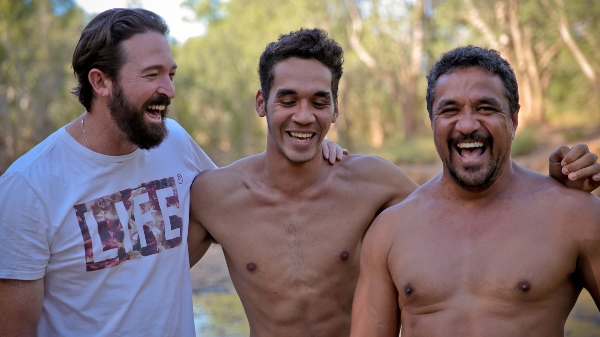Alec Doomadgee and Aaron Petersen talk to IF Magazine on making ‘Zach’s Ceremony’ together
Alec Doomadgee and Aaron Petersen on making ‘Zach’s Ceremony’
By Jackie Keast
Aaron Petersen, Zach Doomadgee and Alec Doomadgee relaxing on country at Gregory Downs, QLD. (Photo: Aaron Petersen).
Feature documentary ‘Zach’s Ceremony’ follows Zach Doomadgee, a young Indigenous boy, as he transitions into manhood – balancing life in Sydney with the traditions of his heritage. Zach’s father Alec Doomadgee is film’s associate producer and enlisted Aaron Petersen to direct. The two talk to IF.
Alec Doomadgee:
The original concept for the film was to show the different world that I lived in; working in the media industry, and then going home [to Doomadgee, Queensland] and being involved with my culture.
As it evolved, naturally the camera turned to Zach. I figured if could tell the story of our world, our culture and ceremonies through the eyes of a child, mainstream Australia would let down their guard and see the beauty of our people. I started out with a little hand-held camera doing it all myself.
I came across Aaron in 2009. He was doing the post-production on a TV show called On The Edge that I was working on. By that stage, I’d already filmed a lot of the early stages of Zach’s life. I was already looking for a partner to come on board. I needed to find someone who could understand what I was trying to say and that it needed to be told from an Aboriginal perspective.
Once Aaron got involved he brought in a lot of the technical aspects. For instance, introducing the RED camera. All of the technical stuff, I know nothing about. I used to just grab a camera and shoot what was happening in front of me.
When it first started out Aaron thought he was only going to be stuck with me for maybe 12 months, maybe 18 months at the most. It turned into almost six years, poor fella (laughs). This film is a young boy in his journey into becoming a young man. You can’t just shoot that overnight.
I think Aaron learned that it had to be observational film. He had to earn his respect, not just amongst me and my family, and my son, but he had to come out to my people and sit on country; with my mother and everybody out bush in order to actually really feel what the film was about. I give him all the respect in the world for doing that.
When I brought Aaron into country, he was there on my watch. I couldn’t just show up with a camera out of the blue with a white man and say ‘yeah, we’re going to shoot this, shoot that’. It took me a lifetime to earn that respect amongst my people to be able to do that.
Aaron had a lot to learn from the Aboriginal world, and around what I wanted to say around the historical impact of invasion and the Western world’s impact on my people.
Now he’s got totally different perspective. To me, that’s the true beauty of this film, is to be able to change people and give them a different perspective. Not only that, but give people hope that we can have a better future together. To me, Aaron’s and my relationship is a perfect example of what can be achieved if we can start working together in a respectful manner.
Now I regard Aaron as a brother of mine. I regard his two boys as my nephews and vice versa. I know we’ll always have a relationship now, no matter what we go off and do.
He formed a really close bond with Zach; those two still talk on a regular basis. Zach’s got his 18th birthday coming up. I’m sure Aaron will be there for that. He’s part of our family.
Someone even asked my mother [about Aaron] at the Sydney Film Festival. She said, “Well, Aaron, he’s my son. That’s my son, that’s the brother of my son Alec.” We’re related no matter what. That’s just been a beautiful journey for us.
Aaron Petersen:
It was back in 2009 I met Alec. He loves to talk and so we were having a chat about who he is and what his background is. He was sharing a lot of information about his country, his family and his culture. Alec speaks so powerfully and confidently about his culture. He told me about his son Zach, what his plans were to go through his ancient rite of initiation.
I was a new father [then] – I have two little boys. It was interesting hearing about it, because I have a sort of loss of identity. I know where I was born, where my grandparents are from and parents are from, but there’s no solid line. Hearing what he has with his family and what he’s able to share with his son just captivated me straight away. I think he saw that interest in me. We just struck a chord and kicked off from there.
We didn’t really know what documentary we were going to be making at that stage. We always knew that our end goal was Zach getting to ceremony; we just didn’t know what the path was going to be.
Over the years as we filmed, we discovered that this wasn’t just an Indigenous themed documentary following a boy into his ancient rite of initiation. This was a universal father and son story unfolding in front of us.
We finished filming when Zach was 16. Then we spent a whole year in post-production piecing it together because we had something like 450 hours of footage.
I went through a huge transformation. Not understanding a lot about the culture, I had to go through my own process to really get an understanding of what Zach was facing, what Alec was facing day to day. To their credit, they opened up and trusted me to be the person to capture their story.
I’m a white guy, and I can’t be trying to tell an Indigenous story. I can’t even start to pretend that I know what they’re going through. After a short time I quickly learnt that my position in this situation was simply to be an enabler. I had to capture what was unfolding in front of me.
Alec had been talking to the elders for a long time as to what was going to happen [when we went to shoot on country]. He was taking a little camera up there, starting to get them used to the camera being around. Alec played a huge part in making sure that we had that opportunity.
We went out to experience the full spiritual journey; what Alec and Zach were going through. I saw it, I felt it; I was on country with them. The presence there – it’s just incredibly magical and powerful.
Alec’s mother Noreen now considers me her son; Alec calls me his brother. We’ve got an incredibly strong friendship that’s been through a lot.
I feel a part of their family now. I know I’m going to be able go back to Doomadgee or any of the other communities at any time and be welcomed straight back in.
http://if.com.au/2017/02/01/article/Alec-Doomadgee-and-Aaron-Petersen-on-making-Zachs-Ceremony-together/BBBUGSBWDN.html


